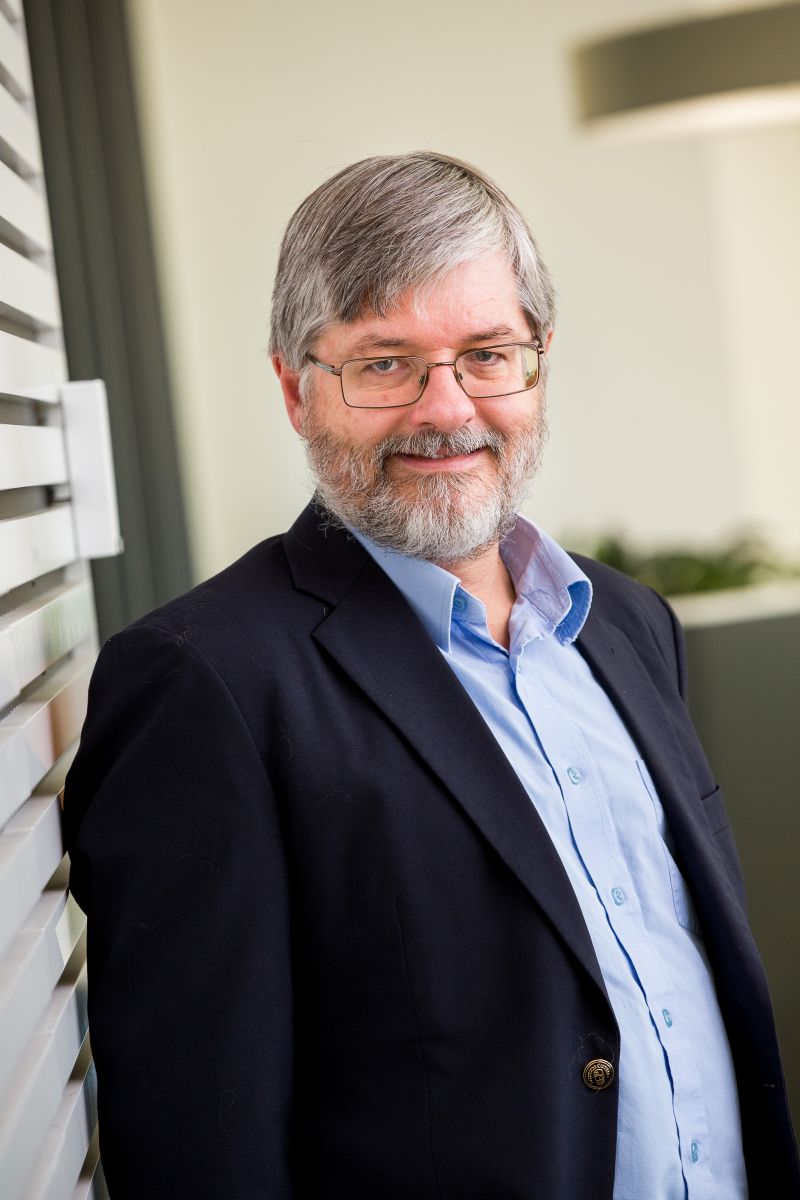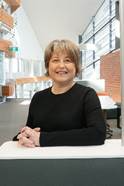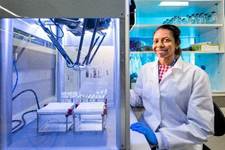Bio21 Director's Message - Dismayed on International Women's Day - 10 March 2021
 On Monday we celebrated International Women’s Day. In past years Bio21 has hosted some amazing events such as the Bio21 International Women’s Day Forum, celebrating and showcasing the work of women across the Institute and last year, an event where we heard from Bronwyn Kingwell, Senior Director, Research Therapeutic Lead, Cardiovascular and Metabolic Diseases, CSL and ARC Georgina Sweet Laureate and group leader, Department of Biochemistry and Molecular Biology at Bio21, Leann Tilley. These events gave us cause for optimism, providing a voice for our women, celebrating our female leaders and showing us that despite the way to go, we’d made some significant gains. We heard that in the course of people’s careers, significant change had occurred and that women in science today are increasing in number, accepted, welcomed and expected in the lab, in the lecture theatre, as lead authors and co-authors on publications and as attendees and speakers at conferences (with babies in tow).
On Monday we celebrated International Women’s Day. In past years Bio21 has hosted some amazing events such as the Bio21 International Women’s Day Forum, celebrating and showcasing the work of women across the Institute and last year, an event where we heard from Bronwyn Kingwell, Senior Director, Research Therapeutic Lead, Cardiovascular and Metabolic Diseases, CSL and ARC Georgina Sweet Laureate and group leader, Department of Biochemistry and Molecular Biology at Bio21, Leann Tilley. These events gave us cause for optimism, providing a voice for our women, celebrating our female leaders and showing us that despite the way to go, we’d made some significant gains. We heard that in the course of people’s careers, significant change had occurred and that women in science today are increasing in number, accepted, welcomed and expected in the lab, in the lecture theatre, as lead authors and co-authors on publications and as attendees and speakers at conferences (with babies in tow).
But the past year and even the past week have left me doubting this progress and feeling dismayed.
Although as an Australian society we lauded Grace Tame as Australian of the year for her advocacy for women who have been sexually abused, in the following weeks, we’ve seen an avalanche of claims from young women who experienced abuse, despite being part of organisations tasked with empowering them. It’s not enough if the rest of society fosters misogynistic attitudes in young men.
In addition, it has been extremely disappointing and enraging to see that amongst our political leaders and lawmakers, women are still silenced and experience stigma when they become victims of sexual and gendered crime.
In the past year, in the field of science, COVID-19 has illuminated the inequalities and challenges faced by women.
All of sudden, the worlds of home, work and school collided. Women, who predominantly carry the caring and household responsibilities have struggled, without the extra supports in place.
Some of our members of the Bio21 Institute have kindly shared their personal experiences of the past year, responding to my questions as to the challenges they faced; the opportunities that have arisen for them and their thoughts on how to prevent losing hard-won gains.
What has been the greatest challenge for you during the pandemic?
 A/ Professor Megan Maher, group leader, School of Chemistry:
A/ Professor Megan Maher, group leader, School of Chemistry:
Like many others, I found the lock-down periods during the pandemic challenging. My youngest son has special needs and was in Year 6 in 2020. Combining home-schooling, for which he needed constant support, with work was difficult. I supported him during the school periods and then did my own work after school ended for the day. This, combined with running my laboratory remotely and converting to virtual teaching delivery meant I felt like I was working constantly (I probably was!).
 Professor Uta Wille, group leader, School of Chemistry:
Professor Uta Wille, group leader, School of Chemistry:
Personal: Hoping that my daughter (the ‘girl’) would be able to adapt to an environment without social contacts with her friends from school, being able to learn online without suffering too much and being able to cope with the fact that she could not do her favourite thing for the major part of the year: horse-riding. It will be interesting to see in a couple of years how this one year (which is still ongoing in a way) has shaped the youth of the 2020s.
I myself have been fine, I must say. It was pretty easy to adapt to the “wfh” lifestyle (apart from the fact that these circumstances made it difficult to separate work-hours from non-work hours, in the end my work-hours were considerably longer).
Challenges came more from the actual work – as Associate Dean for Undergraduate Studies in the Faculty of Science, I was directly involved in the management of the transition of “F2F” learning to virtual learning. Not only that I had to teach online myself, but it was also the many, many short-notice meetings with the faculty and the university leadership, where government policies due to the various lockdowns/easing lockdowns, had to be translated into guidelines for how we are teaching and assessing student learning.
Impact on research: this was huge! We are an experimental research group, and the fact that labs were closed for quite some time caused a lot of anxiety in my research students. We have tried to keep each other sane by having zoom group catch-ups every second day each week, just to check in on each other. Keeping the students motivated; trying to make them feel good despite the fact that they could not go into the lab – lack of progress wasn’t their fault but some still took it to their hearts as if it was their fault. It was really tough, even heart-breaking a times (for me), but I am proud how well my students overall emerged from the other end of the tunnel. Their resilience has been an inspiration, I must say.
What opportunities have arisen as a result of the pandemic that help women/support gender equality?
Megan Maher: To be honest, I find this question very difficult to answer, since my immediate reaction is to say ’nothing’. There are quite a number of recent studies that show that the pandemic significantly impacted people with carer responsibilities (quite often women) in terms of numbers of scientific outputs, ability to maintain research momentum etc., which is a significant concern given that so much of the assessment of our research and ability to attract research funding is based on publication outputs. On the positive side, the pandemic did prompt innovation in terms of how commonly accepted face-to-face activities, such as conferences, meetings, field work and research could be done in a different way. I hope some of these practices will remain, because many of them have the potential to lead to an improved work-life balance for all genders.
Uta Wille: No idea, have any opportunities arisen? Women were over-proportionally affected by the lockdown and the double-whammy of trying to work and home-schooling their kids. I can only hope that policy-makers use these facts to really bring in changes to the workplace. Allowing parents to work from home and more flexible working arrangements would be good. The office in the University (or any other ‘business’) is where computer-based work can be done.
What do we need to do to prevent gains made in the area of gender equality in science from being lost?
Megan Maher: This is a significant challenge. Although it would require more resources, I feel individual approaches are required to address this, since I don’t think the pandemic affected any two people the same way. Depending on individual circumstances that include carer responsibilities, the home environment, mental health status, the presence or absence of work-based support networks, restrictions on laboratory-based research (which varied enormously across institutes and even between Departments/Schools within Bio21), some people were incredibly productive last year and others struggled. These individual circumstances need to be taken into account when supporting individuals to further their research careers. With a focus on supporting female scientific research careers, some people may need more time to reach career milestones, others may need targeted research support in terms of funding for research staff or infrastructure and some may need to be relieved of non-research related duties in order to catch up.

Dr Michelle Christie, Parker Lab: We have made much progress in raising awareness on gender equality in science in the past few years. Everyone (not just those in leadership and funding bodies) needs to practise respect in our everyday interactions with people. Equality will then become our culture and will be more sustainable.
Michelle’s reminder that ‘respect’ lies at the heart of these endeavours is important. This applies to our whole community and in the past year, we changed the name of our the Bio21 Women’s Committee to the Equity, Diversity and Inclusion Committee.
 The chair of the committee, A/Professor Guy Jameson with an invitation to be a part of initiatives that support an inclusive, diverse, fair and respectful culture at Bio21:
The chair of the committee, A/Professor Guy Jameson with an invitation to be a part of initiatives that support an inclusive, diverse, fair and respectful culture at Bio21:
Guy Jameson: The start of a new semester brings all new challenges to what was a very challenging 2020. Research has been on hold for many researchers, especially those with young children who had to home school. Everybody’s mental health has been tested in one way or another and we won’t know the long-term effects of that for quite a while. This has been exacerbated by the pandemic reset program of the University which adds more uncertainty to the lives of many. This is one area I wish to highlight this year as chair of the Bio21 Equity, Diversity and Inclusion Committee. Please contact me if you wish to help implement this (guy.jameson [at] unimelb.edu.au" rel="noopener noreferrer" target="_blank">guy.jameson [at] unimelb.edu.au).
Despite the dismay I feel, I remain hopeful for gender equality. Women are no longer prepared to remain silent and society is taking notice. The pressure for change is mounting.
Michael Parker
Director, Bio21 Institute

